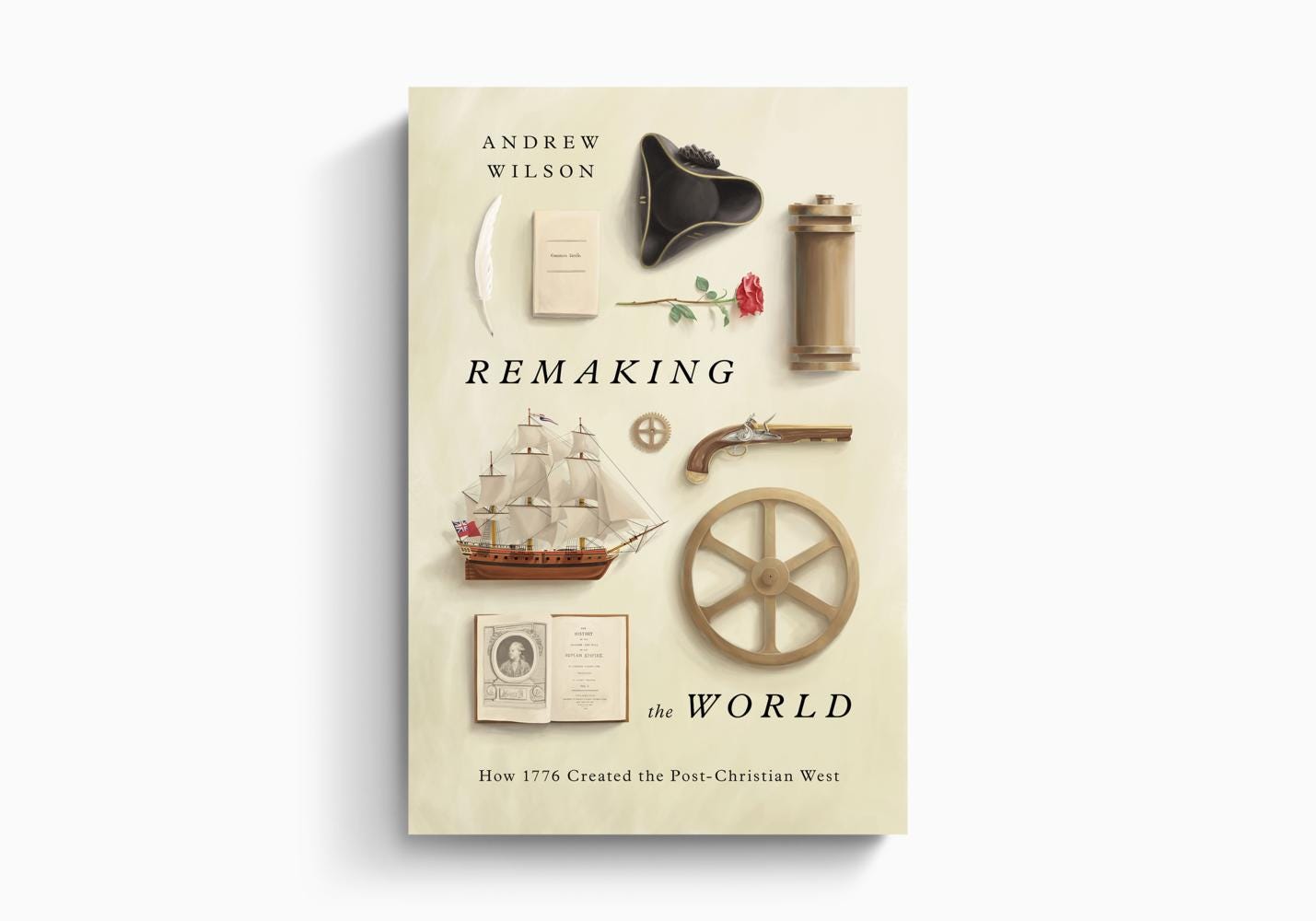I am reading Andrew Wilson’s EXCELLENT book Remaking the World: How 1776 Created the Post-Christian West and there is a great section where he talks about the Declaration of Independence and Thomas Jefferson’s first draft and final form of the opening line.
In a terrific section about the American Declaration of Independence, Wilson notes the explicitly Christian motifs in Jefferson’s language in his first draft; then, how Benjamin Franklin tried to mute its explicitly Christian ambiance. But even Franklin’s muting still amplified the Christian roots of the language. Wilson rightly points out that this is a great example of the secularization of the West, not de-Christanization, rather, taking Christian ideas, keeping them, but trying to sanitize them of their Christian origins.
Jefferson had originally written, “We hold these truths to be sacred and undeniable that all men are created evil.” Franklin objected that the language “smacks of the pulpit” - at least in the John Adams Movie - and so urged Jefferson to change “sacred and undeniable” to “self-evident.”
Except, as Wilson points out, human equality and right to liberty is not self-evident. The equality of all human beings is not obvious, empirical, or true by definition. He writes:
“There are plenty of cultures in which it is not remotely self-evident to people that all men are created equal and endowed by their Creator with certain inalienable rights, let alone that these rights include life, liberty, the pursuit of happiness, and the prerogative to abolish any government that does not preserve me. Most human beings in 1776 did not believe that at all, which is partly why the Declaration was required in the first place” (130).
He’s right, human equality certainly wasn’t evident to the Greeks, Romans, Arabs, Ottomans, Song Dynasty, Incas, Aztecs, Ashanti, Maori, or Cherokee. It is only self-evident to people shaped by the notion of a universal image of God, formed by the Gospels, and the broader Christian tradition. Wilson defers to the Russian philosopher Vladimir Solovyov who pointed out the disparity and dissonance between material atheism and a society still rehearsing Christian ethical teaching: “Man descended from apes, therefore we must love one another” (131).
The irony is, as Wilson points out, even Franklin’s preference for “self-evident” over “sacred” to avoid being heard like a sermonic sound bite is really trading one Christian idiom more another. The notion that all human beings have “self-evident” rights was drawn from the British philosopher John Locke, who made it explicit that he was borrowing from Richard Hooker’s Laws of Ecclesiastical Polity, who got it from the Byzantine Law Code of Justinian, which had bee influenced by the Gospel of Matthew!
Wilson concludes:
“So yes, the equality of all humans seemed staringly obvious (at least in theory) to Franklin and Jefferson. But that was because their culture was saturated with Christian assumption - so much so that the concepts and phrases they used were taken from Locke, who had got them from Hooker, who had got them from Scripture” (132).
Secularization is not necessarily the process of de-Christianization, it can be, but often it is trading in Christian currency without bothering to look at whose face is imprinted on the coins: Christ’s!
To put it differently, many people have built monuments to justice, liberty, and equality, and yet they are oblivious to the fact that the quarry from which their stone was cut was the Holy Sepulcher, and the wood used for the supporting beams is the cross of the Lord Jesus.
All our talks of rights, equality, and liberty is meaningless outside the Christian tradition.
Anway, if you haven’t got Andrew Wilson’s book yet, now is the time to do so!





I've been reading the same book, and you're right, it's excellent. I was also struck by the change Franklin made to the original draft of the Declaration. This fits well with Tom Holland's work and some of the episodes in Justin Brierley's The Surprising Rebirth of Belief in God, another excellent series.
So glad you are reading it. It is truly an extraordinary book. I read it first on kindle, and then bought a hardback copy just to keep. So much to think about. And Wilson did a masterful job of research to pull it all together.